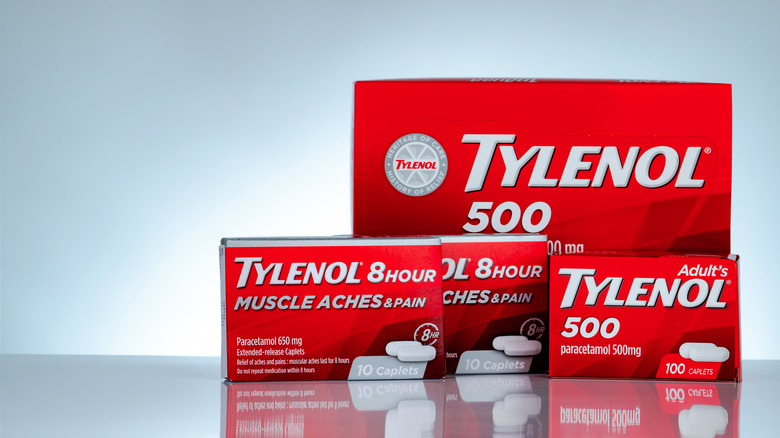Aleve Vs. Tylenol: Which Is Recommended More By Doctors?
There are many over the counter (OTC) pain releivers to choose from, and sometimes it can be confusing to know which is the best treatment for your ailment. There are significant differences between OTC pain relievers like Tyenol, Advil, Excedrin, and Aleve, and while all may help with pain, not all target pain in the same way. Not only do these medicines contain different ingredients, they can also cause a variety of side effects.
If you have ever experienced joint pain or a migraine headache, chances are you have tried some of these products for pain relief. Even if you have a favorite among them, there are certain OTC pain relievers that may work better than others for your specific area of pain.
Medical News Today explains that OTC products containing acetaminophen, like Tylenol, work by blocking pain signals in the brain and the nervous system. Non-steroidal anti-inflammatory drugs, such as naproxen, the main ingredient in Aleve, work to decrease pain by reducing inflammation (via NHS).
Tylenol and Aleve are effective at treating pain
The Iowa Clinic shares that your first line of defense against pain depends on where your pain is. They suggest Tylenol for headaches and Aleve for muscle aches or strains. American Academy of Family Physicians explains that Aleve and Tylenol are both good choices to treat moderate pain, including headaches. Harvard Health Publishing reports that while both are helpful for pain relief, Aleve may be a bit more effective in some cases, as it also addresses inflammation.
Both naproxen and acetaminophen have infrequent but concerning side effects. Healthline explains that although side effects from using Tylenol are not common, you might experience an allergic reaction. When taken in high doses, acetaminophen poisoning can occur and cause liver damage. The U.S. Food and Drug Administration recommends using OTC products containing up to 325 milligrams of acetaminophen, and Harvard Health Publishing equates this dose to that of regular-strength Tylenol.
Naproxen may cause stomach irritation, including intestinal ulcers, and when taken for long periods of time at high doses, it might increase the risk of heart attack, stroke, and kidney failure (per Harvard Health Publishing).
The bottom line is both of these OTC medicines are helpful at treating pain and generally safe when used occasionally, but if you have concerns or persistent pain, seeing your doctor is the best choice of all.

